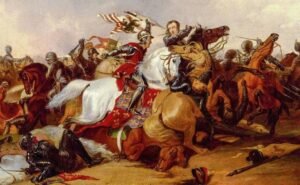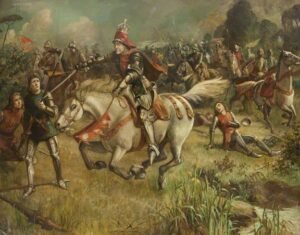William Shakespeare is one of the most extremely persuasive writers ever, and his works lastingly affect writing, theater, and famous lifestyle. Richard III stands glad among his many plays, uncommonly for the emotional and imperative lines added with the guide of its nominal man or lady. One of the play’s most notable statements is, “A pony, a pony! My realm for a pony!” This line, verbally expressed through Richard III during a fundamental second inside the play, typifies issues of distress, misfortune, and the human condition. This article will investigate the setting of this line, its importance, and its effect on both the play and the interest group.
The Setting of the line
the line “A pony, a pony!My Kingdom for a Horse!” appears in Act Five, Scene 4 of Richard III. As of now, inside the play, Richard is in the middle of the battle of Bosworth field, a climactic conflict of words between Richard and Henry Tudor, who will, in this manner, end up being Henry VII. As the fighting furies on, Richard ends up walking around dropping his pony, which represents the two his substantial strength and his illustrious notoriety. In a moment of sheer distress, he shouts out for a pony, able to change his whole state for a way to get away or battle practically.
This second catches Richard’s change from a powerful ruler to a frantic man forestalling for endurance. Throughout the play, Richard is portrayed as a clever and savage individual, leaning to visit any lengths to get his points. In any case, this line uncovers his weakness and the transient idea of force. Generally, it mirrors that regardless of how successful one might be, there are minutes when examples can deliver that energy useless.
Topics and Imagery

The street “My Kingdom for a Horse” is well off in topical substance material and imagery. It addresses the overall subject of aspiration and its outcomes. The guide of desire drives Richard III, and his journey for influence drives him to dedicate egregious demonstrations comprising murder and selling out. However, at this imperative point, his interests and plans reduce directly to a basic solicitation for a pony, showing how quickly fortunes can exchange.
Besides, the actual pony represents power, versatility, and illustrious power. In middle age examples, a pony was not only a method of transportation; it turned into a picture of notoriety and strength. By dropping his pony, Richard loses at this point, not best his strategy for escape anyway, likewise his status as lord. This second can be noticeable as a comment on the fleetingness of energy. No matter what, Richard’s ahead time triumphs as he continues looking for the lofty position; he is diminished to a decided parent, highlighting the delicacy of his rule.
The impact of the street
The effect of Richard III’s line stretches out past the actual play. It has become a social reference point, frequently cited or referred to in various media, writing, and regular correspondence. “My Kingdom for a Horse” is often used to unequivocal franticness or readiness to forfeit something of top-notch incentive for a choice to a squeezing issue.
Besides, this line has started an interest in the man or lady of Richard III and the antiquated setting of his rule. The play depicts Richard as a miscreant, yet verifiable bills of Richard III’s presence are more prominent and complex. The creation of Richard’s visits in 2012 under a vehicle leaving zone in Leicester, Britain, has energized interest in his heritage. This line shows how the impression of verifiable figures can trade over the long run and how writing shapes our history expertise.
end
In the end, the line “My Kingdom for a Horse! My state for a pony!” is one of the most extremely notorious minutes in Shakespeare’s Richard III. It embodies the subjects of desire, power, and distress that run however long the play lasts. In an unmarried second, Richard’s stupendous goals go to pieces, leaving him as a frantic man sticking to the remains of his influence. This line resounds past the bounds of the play, filling in as a strong sign of the delicacy of energy and the human circumstance. Shakespeare’s capability to catch such confounded sentiments in simple language makes his works undying, and the significance of this line is as yet felt in writing and custom these days. Through Richard III’s impactful supplication, we’re helped to remember the acknowledged battles we all face in our journeys for power, security, and notoriety.

FAQs
1: What does the street “My Kingdom for a Horse” recommend?
The line communicates Richard III’s franticness at some stage in the skirmish of Bosworth field. He leans to substitute his entire country for a pony, representing his absence of solidarity and his requirement for a strategy to break out or battle. It features the momentary idea of solidarity and desire.
2: Where in the act and scene does this line show up?
This popular line appears in Act 5, Scene 4 of Richard III. It is spoken via Richard for the length of the climactic snapshots of the contention, displaying his change from a powerful ruler to a decided parent battling for endurance.
3: How does this line reflect Richard III’s individuality?
The line features the duality of Richard III’s personality. Indeed, even as he is depicted as a saucy and imposing reprobate throughout the play, this second displays his weakness and urgency. It highlights the idea that paying little mind to how strong one might be, events can fast substitute, diminishing even the mightiest to a condition of weakness.
4: What are the more extensive issues connected with this line?
The line typifies various subjects, including the brevity of force, desire, and franticness. It delineates how rapidly fortunes can move and fills in as an update that energy might be an armada. The second likewise brings up issues of uncontrolled desire as Richard’s mission for the privileged position closes in his ruin.






















